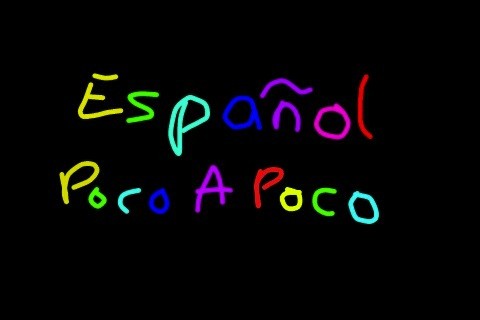Español: Poco A Poco

¡Hola! ¿Como estás? Me llamo Duyen. Is what I learned at uni. And in Spain? Little by little I learned ¡Joder! ¡Coño! Extremely “useful” expressions that you will hear in almost every second or third sentence meaning F*** and S***. Of course, I try not to use these words too often, but it’s a way to get acquainted to the language itself. And most importantly, you can break the ice easily and make Spanish people laugh.
That reminds me of my ESN colleague. Let’s call him Jimmy. Jimmy started to learn Spanish when he arrived in Spain. He used to have a small notebook in his pocket for writing everything down that could help him in daily life. And guess what? He really did so. For example, after a sightseeing tour in Madrid with ESN, we, people of Villanueva de la Cañada, took the bus home. While we were on our way, Ronny taught Jimmy to say a nice sentence. Maggie, who understood it, said to Jimmy that he would get a slap in his face if he said it to a girl. Jimmy looked around and found our coordinator Dario and said, “Quiero tocar tu cuerpo. ” Dario started to laugh so much. He couldn’t stop. And Jimmy still didn’t know what he actually said looked surprised. Finally, someone else told him that he said, “I want to touch your body. ”. Now everything was clear.
I & Spanish

After two years of Spanish at uni I should have level B2, speaking fluently close to a native speaker, and understand complex texts. But to be honest I didn’t. Learning a language at uni is totally different comparing to daily life in a Spanish speaking country. So there I was... training my listening and speaking skills. Starting with
Phase 1:
Listening: Although I used to listen to Spanish music, I could not keep up with the Spanish people. They speak so fast that it was hard to understand a word. When I listened to them talking to each other it sounded like a mix of a ringing traditional alarm clock and a hissing snake, “RRR SS RRRRR SS RRRRRR SS RRRRRRR SSS. ” But I still thought that Spanish was a seductive language.
Speaking: Quite basic saying who I am, where I come from, what I study, and find the right way to the next location. When I wanted to say a longer sentence, it was a challenge because that required much more time to think about the words, conjugation and structure.
Phase 2:
Listening: After a few days, I could mostly understand the first and the last word of a sentence.
Speaking: It was a little bit easier. I could say more short sentences and a few longer ones without thinking too much about it.
Phase 3:
Listening: I understood more words but I still needed to concentrate myself a lot.
Speaking: I was able to say longer sentences.
Phase 4:
Listening: I understand almost every word.
Speaking: I can speak more fluently but sometimes I need to take a small thinking break.
Phase 5: Goal
Listening: I want to understand a “normal” – super fast – conversation between Spanish natives.
Speaking: I want to speak as fast as Speedy Gonzalez runs.
I guess you have similar experiences with Spanish or another language. I’d be very interested in how you got from level zero to hero. Like in most of my posts, I also prepared some tips for you.
10 Survival Tips: Spanish Language
Everyone experiences it differently and therefore should develop one’s own strategies. These are my personal advises to inspire you.
- Study 15 minutes per day. That’s like a power nap, right? You can decide yourself whether to solve grammar exercises or learn vocabulary wherever you want, as long as you do it regularly. You remember more when you repeat it everyday for 15 minutes than learning it for two hours once a week.
- Combine Spanish with your hobbies. I’m pretty sure you have some. It can be sports, music, cooking, or other interesting activities.
- Get out and be surrounded by Spanish natives who know little or no English, and socialize. It’s quite easy to get in touch with them as they are quite tolerant towards strangers and always know what to talk about.
- Make mistakes. The more mistakes you make, the more you remember, and thus the faster you improve your Spanish.
- Concentrate on the context. Especially, when you listen to a conversation, you notice yourself translating the first sentence, while the topic has already changed, right? Try to stay open, understand a few words, observe the gestures, and interpret those.
- Accept talking like an automatic translator at least for a month. Everything is fine! Don’t worry... doodeldoo de doo... Be happy!
- Find an exchange partner. There is always a nice native that can teach you Spanish. You can either teach your language or other things that you are good at.
- Write new vocabulary down. It goes from your hand into your head.
- Connect words and phrases with situations. Learning words that you deal with every day are easier to remember.
- Listen to and sing Spanish songs. That is my favourite one, in the morning, while cooking, or on the way to uni. There is always time for music!
Of course I also have some websites for you. See below:
Helpful Websites
Duolingo - Learn by Translating
Check this out. You learn a language for free by translating web info regarding your language level. The more people join, the better! A short video introduces you to the concept.
Livemocha - Interactive Language Module
Once you are registered, which takes only a minute, you can learn a limited amount of vocabulary and do several exercises that other livemocha users correct for you. It includes writing, speaking, reading and listening exercises and live chats in a lot of different languages.
Note: It requires self-discipline to take your time, sitting at the computer and do the exercises on a regular basis.
Wrts - Online Vocabulary Trainer
This is a Dutch website but don’t worry. The beauty about this website is that you register within a few seconds and can start to write your vocabulary list right away. After that you can choose to repeat it in different ways. You can choose to see one word and write the translation, or see the word for a second and write it down, or do a quick multiple-choice exercise.
Note: It takes some time to type it in but after that you can learn the words fast and easily.
Colby, Bowdoin y Study Spanish- Grammar Exercises
are websites with Spanish grammar exercises as well as good and brief explanations.
Note: Very helpful!
Coachsurfing - Social Network
Here you can find your exchange partners or if you like to do other activities. Therefore, it is advisable to fill in your profile a little bit with basic information and interact with the members in the groups, for example:
- MADRID: City & Surroundings,
- MADRID ADVENTURE,
- Madrid: Culture & Art & Language,
- Language Exchange Meetings in Madrid,
- Madrid Cooking,
- New to Madrid.
Note: It is also a great opportunity to meet people from different countries if you want to know good insider tips.
4 Sale in Madrid is a facebook group for everyone living in and around Madrid and wants to sell or buy items. For example, in case you want to leave the country and don’t know where to put the stuff that you don’t need anymore. It is very popular in Groningen where you can always find someone for the right item.
Note: It has just started in Madrid and needs more members to increase the number of offers.
Last but not least, I have a nice picture for you that I found at the metro station.

Guess what it means. Feel free to comment!
The next post will be a surprise.
¡Hasta luego muchachos!
Photo gallery
Content available in other languages
- Español: Español: poco a poco
Want to have your own Erasmus blog?
If you are experiencing living abroad, you're an avid traveller or want to promote the city where you live... create your own blog and share your adventures!
I want to create my Erasmus blog! →






Comments (14 comments)
Me gusta mucho!
Genial el cartel de: "¡Tenemos un huevo que aprender!"
Quién sabe quién es Jimmy?? =) yo sééé =)
well done. good luck with your Spanish learning process=)
jeje muy bueno! aunque hablando alemán... el español no tiene misterio!!! :P
Useful and very funny. Like it!)
hahahah ronny sona muy simpatico ;) espero que escribires mas, bien hecho duyen.
Muy biennn Duyen :)
love your links (and your mystery friend jimmy)
Ich freue mich sehr zu lesen was du so alles kannst! Ich bin begeistert! Einfach klasse!
Are those eggs in the picture? :P so...which level are you currently? I suppose it's fifth?
Just remind me. Solo hablaré en Español, siempre se me olvida, te prometo que lo intentaré, jeje. ;-P
JAJAJAJA, that's eggs, remind me to the toy.... you could learn a lot from them, check this; http://img23.imageshack.us/img23/7638/pegatinastoi.jpg
Hi!
As you may have heard, Livemocha is no longer in business and that link no longer works.
Also, site, https://www.lingq.com/, is an web and mobile language learning tool for learning languages in context. This is a good analog of Livemocha!